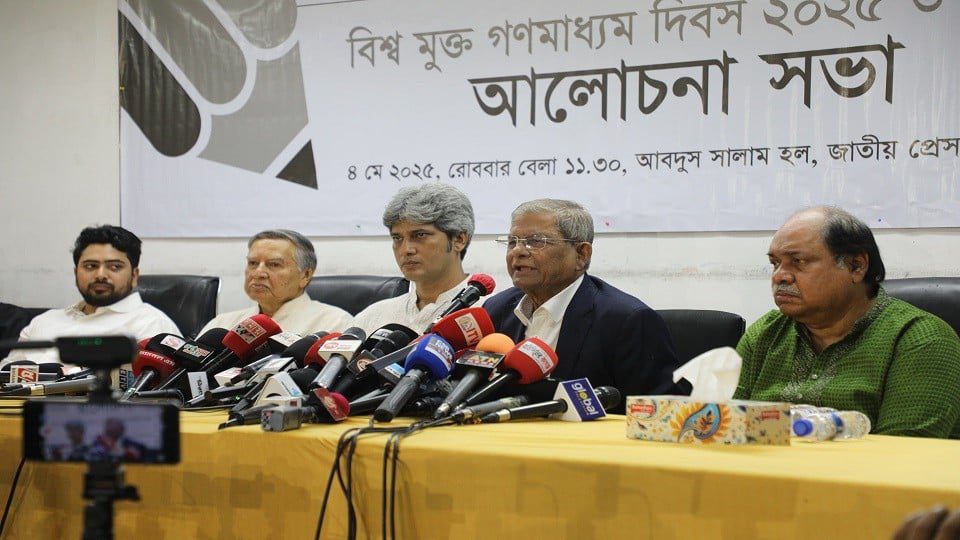Leaders of the Editors’ Council and top newspaper editors voiced grave concern over the increasing number of lawsuits targeting journalists, warning that the trend poses a serious threat to press freedom in the country.
Their concerns were raised during a discussion held on World Press Freedom Day 2025 on Sunday, just as a global media watchdog reported a modest improvement in Bangladesh’s press freedom ranking under the interim administration led by Nobel laureate Muhammad Yunus.
“The mass filing of cases against journalists is a direct attack on independent journalism. It is alarming and unacceptable.” Mahfuz Anam, President of the Editors’ Council and Editor of the Daily Star told the discussion.
The Council arranged the discussion attended by senior journalists and political leaders at the National Press Club.
Referring to official figures, Anam noted that some 266 journalists are currently facing legal cases involving charges related to murder or violence.
“This is shocking. Even under the Digital Security Act, around 200 journalists were charged. Now, we are seeing 266 journalists being accused of serious crimes like murder and violent offences. It is a matter of great shame for us,” he added.
Anam further criticised the inaction in these cases.
“Some of these journalists have been entangled in legal battles for six to seven months, yet there has been no progress in the investigations,” he said.
“If someone is genuinely guilty, prosecute them properly — we will not defend anyone proven to be against society or the protests in July–August. But if the state fails to investigate, these cases become tools of intimidation,” he added.
Mahfuz Anam mentioned that many journalists now live in fear of “mob attacks” and highlighted that 13 journalists are currently behind bars, with no progress in their legal proceedings or access to bail.
“If they are guilty, they should be tried. But why are they kept imprisoned for months without due process?” he questioned.
Anam criticised the current pattern of legal harassment, where blanket lawsuits are filed naming 100 or more individuals, with journalists being included among the accused.
He pointed to remarks from the government’s Law Adviser who said that the government cannot interfere, as the people have the right to file cases.
“Fine, but if laws are being abused, does the government not have a responsibility to act? That’s the real question,” he said.
Offering a concrete proposal, Anam urged the government to review a random sample of 10 to 15 cases where journalists are among the accused.
“If even a few cases are found to be false, why won’t the government take action? Claiming ‘we can’t do anything’ only emboldens those harassing journalists. I strongly condemn this practice and call on the government to stand by the journalists.”
Reaffirming his support for justice, he added, “If a journalist is found guilty, we will stand by the government. But indiscriminately targeting journalists en masse is an attack on press freedom and a matter of grave concern.”
He also expressed cautious optimism about the interim government, describing it as a “government of transition and reforms.”
“We hope this government strengthens democracy and the right to free expression. However, current legal harassment of journalists contradicts that hope. Even murder cases are being weaponised to deny bail, which appears to be calculated,” he added.
Anam concluded by urging relevant ministries — law, home affairs, and others — to take proactive steps. “This isn’t just demoralising for us; it damages Bangladesh’s global image,” he warned.
Also speaking at the event, Manabzamin Chief Editor Matiur Rahman Chowdhury said, “In a country where asking questions costs journalists their jobs, we are ironically observing World Press Freedom Day.”
“I am stunned — who should I blame? The government, the media owners, the journalists’ unions, or even the Editors’ Council, of which I’ve been since its founding?”
He added, “We need self-reflection. We must assess what we’ve truly achieved. To be fair, the situation has improved compared to last year. Much has changed.”
Chowdhury also criticised division within the media, particularly among newspapers and television outlets. “These internal divisions must end immediately,” he urged.
New Age Editor Nurul Kabir delivered the opening remarks. He said, “When we celebrated World Press Freedom Day last year, it was under very different circumstances. A lot has changed since then — or at least the signs of change have become visible.”
He stressed that progress depends not only on journalists but also on those who govern and legislate.
“Whether we can turn those signs into positive outcomes depends greatly on the political leadership and their commitment to change,” he said.
The discussion was attended by editors of major newspapers as well as political leaders. Among them were BNP Secretary General Mirza Fakhrul Islam Alamgir, Nagorik Oikya President Mahmudur Rahman Manna, Ganosanghati Andolan Chief Coordinator Zonayed Saki, and National Citizen Committee Convener Nahid Islam.
The session was moderated by Editors’ Council General Secretary and Bonik Barta Editor Dewan Hanif Mahmud. National Press Club President and daily Kaler Kantho Editor Hasan Hafiz also spoke at the event.


